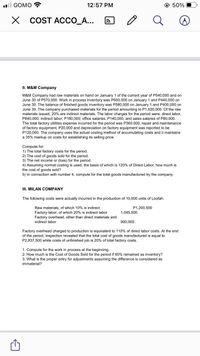
FINANCIAL ACCOUNTING
10th Edition
ISBN: 9781259964947
Author: Libby
Publisher: MCG
expand_more
expand_more
format_list_bulleted
Concept explainers
Question

Transcribed Image Text:ll GOMO
12:57 PM
@ 50%
X COST ACCO_A...
II. M&M Company
M&M Company had raw materials on hand on January 1 of the current year of P540,000 and on
June 30 of P570,000. Work in process inventory was P600,000 on January 1 and P440,000 on
June 30. The balance of finished goods inventory was P580,000 on January 1 and P400,000 on
June 30. The company purchased materials for the period amounting to P1,620,000. Of the raw
materials issued, 20% are indirect materials. The labor charges for the period were: direct labor,
P840,
,000; indirect labor, P180,000; office salaries, P140,000, and sales salaries of P80,000.
The
total factory utilities expense incurred for the period was P360,000, repair and maintenance
of factory equipment, P20,000 and depreciation on factory equipment was reported to be
P120,000. The company uses the actual costing method of accumulating costs and it maintains
35% markup on
ablishing its selling price.
Compute for:
1) The total factory costs for the period.
2) The cost of goods sold for the period.
3) The net income or (loss) for the period.
4) Assuming normal costing is used, the basis of which is 120% of Direct Labor, how much is
the cost of goods sold?
5) In connection with number 4, compute for the total goods manufactured by the company.
III. MILAN COMPANY
The following costs were actually incurred in the production of 10,000 units of Loofah:
P1,200,500
Raw materials, of which 10% is indirect
Factory labor, of which 20% is indirect labor
Factory overhead, other than direct materials and
1,045,000
indirect labor
900.000
Factory overhead charged to production is equivalent to 110% of direct labor costs. At the end
of the period, inspection revealed that the total cost of goods manufactured is equal to
P2,837,500 while costs of unfinished job is 20% of total factory costs.
1. Compute for the work in process at the beginning.
2. How much is the Cost of Goods Sold for the period if 60% remained as inventory?
3. What is the proper entry for adjustments assuming the difference is considered as
immaterial?
Expert Solution
This question has been solved!
Explore an expertly crafted, step-by-step solution for a thorough understanding of key concepts.
Step by stepSolved in 2 steps with 1 images

Knowledge Booster
Learn more about
Need a deep-dive on the concept behind this application? Look no further. Learn more about this topic, accounting and related others by exploring similar questions and additional content below.Similar questions
- Given the following information how much raw material was transferred to work in progress on January 31? Inventory on January 1 is $100,000, raw materials purchased in January are $500,000, and raw materials inventory on January 31 is $200,000 A: $200,000 B: $400,000 C: $600,000 D: $700,000arrow_forwardDirect materials purchased during the year amount to $517,800, and the cost of goods sold for the year was $1,895,000. Prepare a cost of good sold statement.arrow_forwardThe following information is available for the year ended December 31 Beginning raw materials inventory Raw materials purchases Ending raw materials inventory Direct labor expense The amount of direct materials used in production for the year is Multiple Choice $10,100 $5,300 $5,900 $ 4,300 5,800 $5,800 4,800 2,800arrow_forward
- Required: If the December 1 balance in the Direct Materials Inventory account was $20,000, the December 31 balance was $22,000, and $130,000 of direct materials were issued to production during December, what was the amount of direct materials purchased during the month? Purchased amount of direct materialarrow_forwardThe following balances are from the accounts of Tappan Parts: January 1 (Beginning) December 31 (Ending) Direct materials inventory $ 22,300 $ 24,500 Work-in-process inventory 32,800 29,100 Finished goods inventory 5,800 7,100 Direct materials used during the year amount to $46,300 and the cost of goods sold for the year was $53,200. Required: Prepare a cost of goods sold statement.arrow_forwardAt the beginning of the current year, Grant Company’s work in process inventory account had a balance of $30,000. During the year, $68,000 of direct materials were used in production, and $66,000 of direct labor costs were incurred. Factory overhead for the year amounted to $90,000. Cost of goods manufactured is $230,000. The balance in work in process inventory on December 31 is a.$66,000 b.$24,000 c.$44,000 d.$36,000arrow_forward
arrow_back_ios
arrow_forward_ios
Recommended textbooks for you

 AccountingAccountingISBN:9781337272094Author:WARREN, Carl S., Reeve, James M., Duchac, Jonathan E.Publisher:Cengage Learning,
AccountingAccountingISBN:9781337272094Author:WARREN, Carl S., Reeve, James M., Duchac, Jonathan E.Publisher:Cengage Learning, Accounting Information SystemsAccountingISBN:9781337619202Author:Hall, James A.Publisher:Cengage Learning,
Accounting Information SystemsAccountingISBN:9781337619202Author:Hall, James A.Publisher:Cengage Learning, Horngren's Cost Accounting: A Managerial Emphasis...AccountingISBN:9780134475585Author:Srikant M. Datar, Madhav V. RajanPublisher:PEARSON
Horngren's Cost Accounting: A Managerial Emphasis...AccountingISBN:9780134475585Author:Srikant M. Datar, Madhav V. RajanPublisher:PEARSON Intermediate AccountingAccountingISBN:9781259722660Author:J. David Spiceland, Mark W. Nelson, Wayne M ThomasPublisher:McGraw-Hill Education
Intermediate AccountingAccountingISBN:9781259722660Author:J. David Spiceland, Mark W. Nelson, Wayne M ThomasPublisher:McGraw-Hill Education Financial and Managerial AccountingAccountingISBN:9781259726705Author:John J Wild, Ken W. Shaw, Barbara Chiappetta Fundamental Accounting PrinciplesPublisher:McGraw-Hill Education
Financial and Managerial AccountingAccountingISBN:9781259726705Author:John J Wild, Ken W. Shaw, Barbara Chiappetta Fundamental Accounting PrinciplesPublisher:McGraw-Hill Education


Accounting
Accounting
ISBN:9781337272094
Author:WARREN, Carl S., Reeve, James M., Duchac, Jonathan E.
Publisher:Cengage Learning,

Accounting Information Systems
Accounting
ISBN:9781337619202
Author:Hall, James A.
Publisher:Cengage Learning,

Horngren's Cost Accounting: A Managerial Emphasis...
Accounting
ISBN:9780134475585
Author:Srikant M. Datar, Madhav V. Rajan
Publisher:PEARSON

Intermediate Accounting
Accounting
ISBN:9781259722660
Author:J. David Spiceland, Mark W. Nelson, Wayne M Thomas
Publisher:McGraw-Hill Education

Financial and Managerial Accounting
Accounting
ISBN:9781259726705
Author:John J Wild, Ken W. Shaw, Barbara Chiappetta Fundamental Accounting Principles
Publisher:McGraw-Hill Education